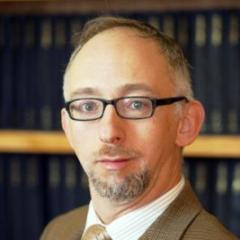
Volunteer of the Month: Cantor Michael Davis
Michael Davis is the cantor at the Lakeside Congregation for Reform Judaism in Highland Park, Ill. He was certified in 2003.
In what capacity have you recently volunteered for the ACC? Did someone approach you, or did you readily volunteer?
Most recently I was a clergy organizer with the Hyatt organization. It was a four year national effort to get a contract for its workers. I was part of this campaign for three years, working alongside Hyatt workers, Cantors and Rabbis and Christian clergy in the suburbs and the city. Working with the ACC Social Action committee, I drafted the ACC’s boycott resolution of Hyatt hotels. The ACC resolution was the basis for the regional Methodist church’s boycott resolution. My synagogue’s Social Action committee got involved in advocating within the Reform movement to honor the workers’ campaign. Last summer, the workers did win a new contract that honors their work and maintains hotel industry standards.
At about the time of the ACC convention in Chicago in 2009, I initiated Reform Cantors of Chicago (RCC), the local ACC cantors group. I reached out to colleagues and led it in its first year. I now do social action on behalf of the RCC. We have a great group of cantors in Chicago and I enjoy working together with colleagues.
In your experience, what’s the best part of being a Cantor?
I’d say it’s being able to move people through singing, through music, through the human voice; and having the emotional trust of people to do that.
What do you see as the biggest challenge for the ACC and the cantorate looking forward into the future?
The biggest challenge that I find myself discussing with other Jewish professionals is the shrinking Jewish community. This is particularly a cantorial concern since the cantor’s position in the synagogue is the second or third in terms of job security. So, when a synagogue has to make the tough decision, they might say: we may be able to manage without a cantor but we cannot imagine having a shule without a rabbi. Those conversations - even if that eventuality never materializes – are unsettling.
How did you become a cantor? Was there someone who, in particular, influenced you?
I come from a traditional family; growing up, Jewish music was part of our family life. Hazzanut runs in my family: my grandfather was a cantor. I studied musicology at Hebrew University in Jerusalem. At the same time, I was working a translator for American journalists. I worked in a news collection agency translating Hebrew articles into English. I could have ended up as a reporter in one of the media outlets. I was also working as a part-time cantorial soloist on the High Holydays. So the cantorate was always there as an option. I had both journalism and Jewish music as possible career paths. But I was drawn to community work, to helping people and so I chose the cantorate.
Tell us one thing about yourself that we might not know that you would want us to learn about you.
In 2012 Archbishop Desmond Tutu praised a rabbinic open letter that I initiated and wrote calling for a peaceful resolution with Iran.

